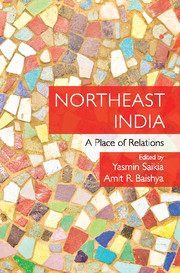Book contents
- Frontmatter
- Contents
- List of Figures
- List of Boxes
- List of Tables
- Acknowledgments
- Introduction
- Section I Contemporary Politics and Issues of Definition
- Section II Creating Presence
- Section III Knowing through Experience
- 7 Dismembered Lives: Narrating History's Footnotes in Aulingar Jui
- 8 Freedom and Frustrated Hopes: Assessing the Jadonang Movement, 1917-1932
- 9 Celebrating a New ‘New Year’ in Tripura: Space, Place and Identity Politics
- Section IV Rethinking Politics
- Glossary
- About the Contributors
- Index
8 - Freedom and Frustrated Hopes: Assessing the Jadonang Movement, 1917-1932
from Section III - Knowing through Experience
Published online by Cambridge University Press: 23 July 2017
- Frontmatter
- Contents
- List of Figures
- List of Boxes
- List of Tables
- Acknowledgments
- Introduction
- Section I Contemporary Politics and Issues of Definition
- Section II Creating Presence
- Section III Knowing through Experience
- 7 Dismembered Lives: Narrating History's Footnotes in Aulingar Jui
- 8 Freedom and Frustrated Hopes: Assessing the Jadonang Movement, 1917-1932
- 9 Celebrating a New ‘New Year’ in Tripura: Space, Place and Identity Politics
- Section IV Rethinking Politics
- Glossary
- About the Contributors
- Index
Summary
In the year 1931 unrest erupted, connected with the rise of Jadonang, a Kabui Naga, in the Indian state of Manipur. It was said that he had started a ‘new religion’ and induced the ‘superstitious Kabui’ to believe that he would overthrow the existing British administration and enable them to take revenge on their old enemies, the Kukis. He was credited with ‘supernatural powers’, treated as a ‘Messiah’, and universally spoken of as the ‘King’ or ‘Spirit King’.
This perception of Jadonang, arising from intriguing and sensational comments made by the Governor of Assam, Robert Reid in 1949, illustrates how, even eighteen years after his death in 1931, an air of mystery and uncertainty lingered around him. While there is a temptation to indulge in retrospective romanticism over Jadonang and the movement he initiated, and this has been done by various writers and Indian nationalist commentators, it is however important to explain and make clear the different historical accounts of Jadonang within his own milieu. Even before exploring Jadonang's story in any depth, it is obvious his activities achieved notoriety. Descriptions such as those made by Reid come from the standard British interpretation of the ‘Jadonang movement’ as crude millenarianism. However, in this paper I will consider a more nuanced account of the Jadonang movement.
First, it is important to clarify my use of the term ‘millenarianism’. Most British sources report that the Jadonang movement involved the ousting of the British and the massacre of the Kukis, culminating in a ‘stupendous feast’ that would herald the end of the world (Bower, 1952; Parratts, 1995; Reid, 1949). This kind of crude millenarianism is based on a strong belief in the imminent end of the world through drastic disruption. My assertion however is that unlike many millenarian activities that promise a quick start and end like a ‘flash in the pan’, the Jadonang movement must be understood over the longue durée. I will suggest, as Joel Robbins reminds us, that millenarianism does not have to be sudden and abrupt, but that it serves ‘as a meaningful and enduring framework for social life despite…
- Type
- Chapter
- Information
- Northeast IndiaA Place of Relations, pp. 181 - 200Publisher: Cambridge University PressPrint publication year: 2017
- 1
- Cited by



